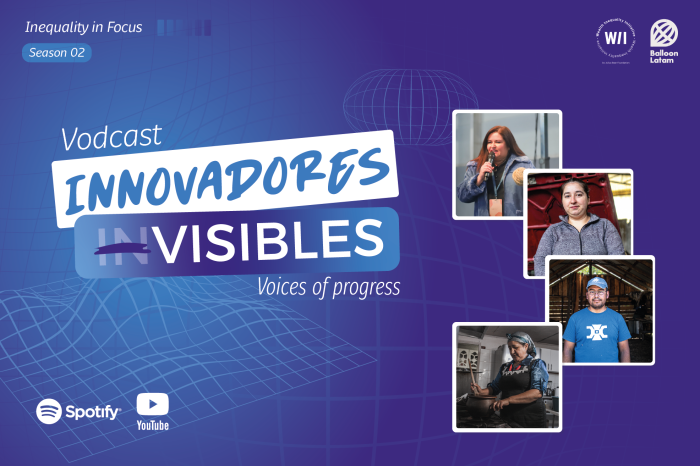Ariane De Lannoy is a professor and chief researcher in the Labour and Development Research Unit of the University of Cape Town. Her work focusses on youth and youth development in the complex post-apartheid context of South Africa, where stark socio-economic divisions persist to this day.
In this podcast talk, Julius Baer Foundation CEO Laura Hemrika converses with Ariane about inequality’s risks and possibilities for change.
I often hear young people talk about how they feel entirely invisible in a society that doesn't seem structured to enable them to move forward.
Witnessing inequality
Conducting research in South Africa, a country that consistently ranks at or near the top of global income inequality indices, regularly confronts Ariane with the extreme gap between rich and poor. She describes data collection in Cape Town’s most deprived areas as a “visceral daily experience”. “I often hear young people talk about how they feel entirely invisible in a society that doesn't seem structured to enable them to move forward”, she says.
Ripple effects reach top
Of course, focusing on inequality means looking at both ends of the spectrum – not just the poor, but also the holders of wealth. Ariane cites recent estimates that the world’s top 1% currently owns over twice as much wealth as more than 7 billion people combined – the vast majority of the global population. This kind of extreme wealth concentration harms everyone. “Countries that face higher levels of wealth inequality, also face worse levels of health and well-being, emotional well-being and physical well-being across all levels of society”, says Ariane. This is because extreme inequality destroys social cohesion, leading to widespread mistrust, insecurity, erosion of institutions, and – in the worst case – violence.
The resulting instability also harms the economy and undermines the conditions needed to create value and wealth in the first place. When rising numbers of people are excluded from meaningful participation in labour markets, investment, higher education, and so on, overall consumer demand for goods and services falls and the economy itself shrinks. So, in the final analysis, these cycles of wealth capture, increasing exclusion and downward development threaten everyone.
Countries that face higher levels of wealth inequality, also face worse levels of health and well-being, emotional well-being and physical well-being across all levels of society.
Turning the tide with partnership
Since 2018, Ariane has been advising the Julius Baer Foundation on wealth inequality projects, initially as an external expert and now also as a Foundation Board member. She acknowledges that inequality is highly challenging to tackle due to the number of drivers involved and the circularity of causes and effects. But she observes that effective policy levers exist – whether redistributive measures or better education access – and highlights the promise of collaboration between philanthropy, academia, and practitioners. United in a “commitment to build a more just society”, the partners can build the evidence bases needed for effective interventions in different settings.
Finally, Ariane commends the courage of the Julius Baer Foundation in seeking to address inequality and acting as a convenor that unites collaborators from all points along the wealth spectrum. Ultimately, she believes, the “sense of isolation” experienced by marginalised young people in South Africa and elsewhere “can be broken by providing a platform for conversation”. Bringing more and less privileged members of society together, as the Foundation’s projects strive to do, enables both sides to understand each other’s lived reality and cooperate on solutions that benefit all.
Did you enjoy this exchange? Who would you like us to meet to discuss Wealth Inequality?
Tell us what you think and share your suggestions with us for our future podcasts with engaging guests

Ariane De Lannoy is an associate professor and chief researcher at the Southern Africa Labour and Development Research Unit at the University of Cape Town. She has deep expertise in developing mixed-methods studies and leading multistakeholder projects. In her work, she is consistently focused on youth and youth development in the complex context of post-apartheid South Africa characterised by poverty and inequality. She describes her work as a visceral daily experience, as she moves between the absolute extremes of the wealthiest and most desperate areas of Cape Town.
Since 2018, she’s been advising the Julius Baer Foundation on wealth inequality projects, first as an external expert and since 2020 as a Foundation Board member.

Laura Hemrika is the CEO of the Julius Baer Foundation, the non profit grant foundation of the Julius Baer Group founded in 1965. Today, together with its partners and co-funders, the Foundation dedicates itself to supporting initiatives around the globe focused on addressing inequality in wealth and education, reinforcing the Bank’s purpose of creating value beyond wealth.
Prior to Julius Baer, Laura was Managing Director of the Credit Suisse Foundation and Global Head of Corporate Citizenship & Foundations at Credit Suisse, responsible for all of the bank’s global philanthropic commitments, partnerships and employee engagement, including collaboration on impact investing product development and client advisory, as well as multiple sustainability, philanthropy, CSR and diversity topics. In this role she co-founded a number of public private partnerships including the Swiss Capacity Building Facility and the SDG Impact Finance Initiative. She also served as Trustee of the Credit Suisse APAC Foundation. Laura’s earlier career was in strategy consulting with Booz and Company as well as with a number of education and financial inclusion start-ups, NGOs and corporates.
Laura has an MBA from London Business School and is a Fellow of the Aspen Institute.
She serves on the boards of several organizations including the European Microfinance Platform, the Impact Linked Finance Fund and Habitat for Humanity.

